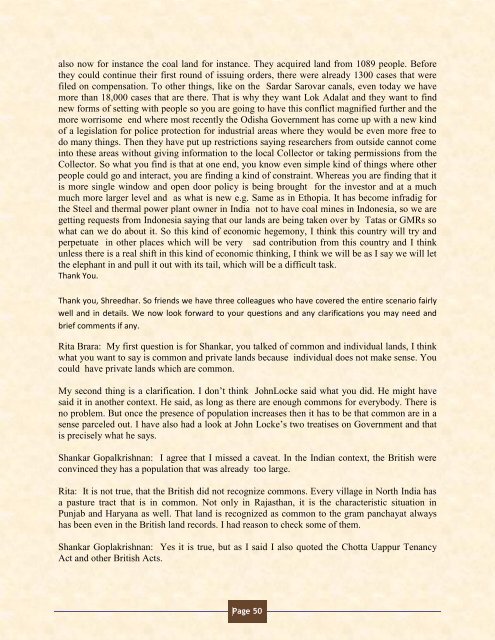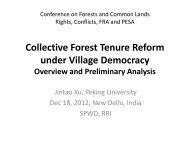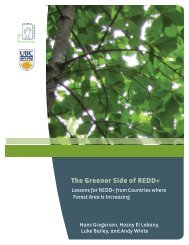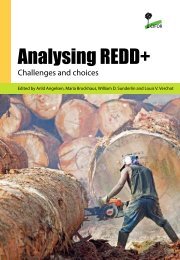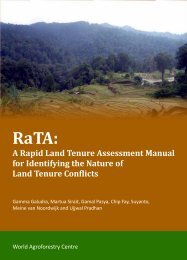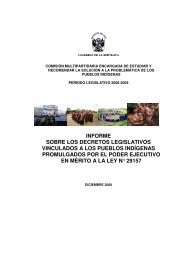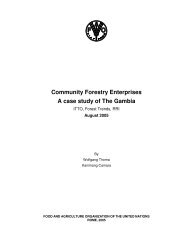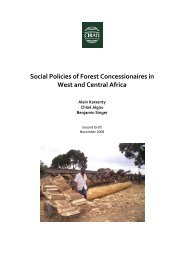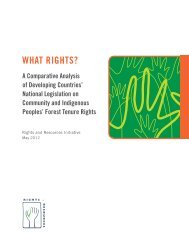Concept Note - Rights and Resources Initiative
Concept Note - Rights and Resources Initiative
Concept Note - Rights and Resources Initiative
You also want an ePaper? Increase the reach of your titles
YUMPU automatically turns print PDFs into web optimized ePapers that Google loves.
also now for instance the coal l<strong>and</strong> for instance. They acquired l<strong>and</strong> from 1089 people. Before<br />
they could continue their first round of issuing orders, there were already 1300 cases that were<br />
filed on compensation. To other things, like on the Sardar Sarovar canals, even today we have<br />
more than 18,000 cases that are there. That is why they want Lok Adalat <strong>and</strong> they want to find<br />
new forms of setting with people so you are going to have this conflict magnified further <strong>and</strong> the<br />
more worrisome end where most recently the Odisha Government has come up with a new kind<br />
of a legislation for police protection for industrial areas where they would be even more free to<br />
do many things. Then they have put up restrictions saying researchers from outside cannot come<br />
into these areas without giving information to the local Collector or taking permissions from the<br />
Collector. So what you find is that at one end, you know even simple kind of things where other<br />
people could go <strong>and</strong> interact, you are finding a kind of constraint. Whereas you are finding that it<br />
is more single window <strong>and</strong> open door policy is being brought for the investor <strong>and</strong> at a much<br />
much more larger level <strong>and</strong> as what is new e.g. Same as in Ethopia. It has become infradig for<br />
the Steel <strong>and</strong> thermal power plant owner in India not to have coal mines in Indonesia, so we are<br />
getting requests from Indonesia saying that our l<strong>and</strong>s are being taken over by Tatas or GMRs so<br />
what can we do about it. So this kind of economic hegemony, I think this country will try <strong>and</strong><br />
perpetuate in other places which will be very sad contribution from this country <strong>and</strong> I think<br />
unless there is a real shift in this kind of economic thinking, I think we will be as I say we will let<br />
the elephant in <strong>and</strong> pull it out with its tail, which will be a difficult task.<br />
Thank You.<br />
Thank you, Shreedhar. So friends we have three colleagues who have covered the entire scenario fairly<br />
well <strong>and</strong> in details. We now look forward to your questions <strong>and</strong> any clarifications you may need <strong>and</strong><br />
brief comments if any.<br />
Rita Brara: My first question is for Shankar, you talked of common <strong>and</strong> individual l<strong>and</strong>s, I think<br />
what you want to say is common <strong>and</strong> private l<strong>and</strong>s because individual does not make sense. You<br />
could have private l<strong>and</strong>s which are common.<br />
My second thing is a clarification. I don’t think JohnLocke said what you did. He might have<br />
said it in another context. He said, as long as there are enough commons for everybody. There is<br />
no problem. But once the presence of population increases then it has to be that common are in a<br />
sense parceled out. I have also had a look at John Locke’s two treatises on Government <strong>and</strong> that<br />
is precisely what he says.<br />
Shankar Gopalkrishnan: I agree that I missed a caveat. In the Indian context, the British were<br />
convinced they has a population that was already too large.<br />
Rita: It is not true, that the British did not recognize commons. Every village in North India has<br />
a pasture tract that is in common. Not only in Rajasthan, it is the characteristic situation in<br />
Punjab <strong>and</strong> Haryana as well. That l<strong>and</strong> is recognized as common to the gram panchayat always<br />
has been even in the British l<strong>and</strong> records. I had reason to check some of them.<br />
Shankar Goplakrishnan: Yes it is true, but as I said I also quoted the Chotta Uappur Tenancy<br />
Act <strong>and</strong> other British Acts.<br />
Page 50


